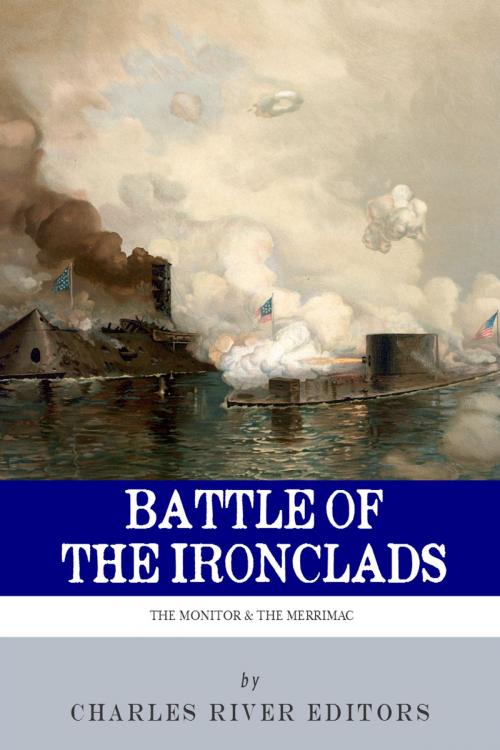The Battle of the Ironclads: The Monitor & The Merrimac
Nonfiction, History, Americas, United States, Civil War Period (1850-1877), 19th Century, Military| Author: | Charles River Editors | ISBN: | 9781475319699 |
| Publisher: | Charles River Editors | Publication: | November 20, 2012 |
| Imprint: | Language: | English |
| Author: | Charles River Editors |
| ISBN: | 9781475319699 |
| Publisher: | Charles River Editors |
| Publication: | November 20, 2012 |
| Imprint: | |
| Language: | English |
*Includes Lieutenant S. Dana Greene's account of the battle from Battles & Leaders of the Civil War*Includes pictures of the ironclads and important people, as well as depictions of the battle.*Includes a Bibliography for further reading.*Includes a Table of ContentsWe of the Monitor think, and still think, that we had gained a great victory. This the Confederates have denied. S. Dana GreeneOn March 8, 1862, the newest era of naval warfare began. That day, the CSS Virginia, an ironclad created out of the hull of the scuttled USS Merrimac by the Confederates, sailed down the Elizabeth River to Hampton Roads, where a Union blockade fleet was anchored. The wooden ships of the North were no match for the ironclad, which quickly rammed and sank the USS Cumberland, and as it trained its sights on the USS Congress, one Union officer noted the former Merrimac fired "shot and shell into her with terrific effect, while the shot from the Congress glanced from her iron-plated sloping sides, without doing any apparent injury." The Merrimac had overwhelmingly demonstrated the superiority of the ironclad over the traditional frigates and gunships of the time, but it met its match the following day. On March 9, the Norths ironclad, the USS Monitor, arrived to challenge the Confederate ironclad. Though they were both outfitted with iron, the two ships had important differences. The Merrimac had more guns than the Monitor but was slower and more difficult to maneuver. The Monitor, however, did not have the size and power. Lieutenant S. Dana Greene described the initial shots in the battle of the ironclads: "The turrets and other parts of the ship were heavily struck, but the shots did not penetrate; the tower was intact, and it continued to revolve. A look of confidence passed over the men's faces, and we believed the Merrimac would not repeat the work she had accomplished the day before." The two ironclads would fight to a stand-still on that day, but naval warfare would never be the same.The Battle of the Ironclads: The Monitor & The Merrimac looks at the history of the ships, the climactic battle, and the aftermath of their fight. Along with pictures and eyewitness accounts, you will learn about the Battle of the Ironclads like you never have before, in no time at all.
*Includes Lieutenant S. Dana Greene's account of the battle from Battles & Leaders of the Civil War*Includes pictures of the ironclads and important people, as well as depictions of the battle.*Includes a Bibliography for further reading.*Includes a Table of ContentsWe of the Monitor think, and still think, that we had gained a great victory. This the Confederates have denied. S. Dana GreeneOn March 8, 1862, the newest era of naval warfare began. That day, the CSS Virginia, an ironclad created out of the hull of the scuttled USS Merrimac by the Confederates, sailed down the Elizabeth River to Hampton Roads, where a Union blockade fleet was anchored. The wooden ships of the North were no match for the ironclad, which quickly rammed and sank the USS Cumberland, and as it trained its sights on the USS Congress, one Union officer noted the former Merrimac fired "shot and shell into her with terrific effect, while the shot from the Congress glanced from her iron-plated sloping sides, without doing any apparent injury." The Merrimac had overwhelmingly demonstrated the superiority of the ironclad over the traditional frigates and gunships of the time, but it met its match the following day. On March 9, the Norths ironclad, the USS Monitor, arrived to challenge the Confederate ironclad. Though they were both outfitted with iron, the two ships had important differences. The Merrimac had more guns than the Monitor but was slower and more difficult to maneuver. The Monitor, however, did not have the size and power. Lieutenant S. Dana Greene described the initial shots in the battle of the ironclads: "The turrets and other parts of the ship were heavily struck, but the shots did not penetrate; the tower was intact, and it continued to revolve. A look of confidence passed over the men's faces, and we believed the Merrimac would not repeat the work she had accomplished the day before." The two ironclads would fight to a stand-still on that day, but naval warfare would never be the same.The Battle of the Ironclads: The Monitor & The Merrimac looks at the history of the ships, the climactic battle, and the aftermath of their fight. Along with pictures and eyewitness accounts, you will learn about the Battle of the Ironclads like you never have before, in no time at all.















